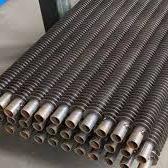What is a Finned Tube Air Heat Exchanger?
Finned Tube Air Heat Exchanger Technology
A finned tube air heat exchanger represents a sophisticated thermal management solution designed to optimize heat transfer between air streams and process fluids. These advanced systems leverage extended surface area technology to achieve remarkable thermal efficiency in compact footprints.
Operating Principle
Finned tube exchangers operate on the fundamental principle of conductive and convective heat transfer. The primary tubes carry the process fluid (water, refrigerants, thermal oils), while the extended fin surfaces dramatically increase the air-side heat transfer coefficient, typically achieving 8-12x surface area enhancement compared to bare tubes.
Thermodynamic Advantages
The unique fin geometry creates optimized boundary layer disruption, reducing thermal resistance and enhancing overall heat transfer coefficients by 40-60% compared to conventional designs. This makes them particularly effective in applications with low air velocity or challenging thermal conditions.
Material
Modern finned tube heat exchangers utilize advanced material combinations including aluminum fins with copper tubes for optimal thermal conductivity, stainless steel for corrosive environments, and specialized coatings like hydrophilic or hydrophobic treatments to enhance performance in specific operating conditions.
Finned Tube Air Heat Exchanger Design
Advanced Fin Configuration Technologies
Modern finned tube heat exchangers employ sophisticated fin designs engineered for specific applications:
| Fin Type | Thermal Efficiency | Airside Pressure Drop | Optimal Applications |
|---|---|---|---|
| Spiral Wound Fins | High (85-92%) | Medium (15-25 Pa) | HVAC Systems, General Industrial |
| Serrated/Notched Fins | Very High (90-95%) | High (25-40 Pa) | High Temperature Processes, Power Generation |
| Extruded Fins | Maximum (92-97%) | Low-Medium (10-20 Pa) | Corrosive Environments, Chemical Processing |
| Plate Fins | Medium-High (80-90%) | Low (8-15 Pa) | Low Velocity Applications, Air Preheating |
Finned Tube Air Heat Exchanger Fluid Dynamics
Advanced CFD modeling enables precise optimization of fin spacing, tube pitch, and airflow patterns. Our proprietary algorithms calculate the ideal fin density (8-16 FPI) based on specific thermal load requirements and pressure drop constraints, ensuring maximum efficiency for each application scenario.
Finned Tube Air Heat Exchanger Manufacturing & Quality
Precision Manufacturing Processes
Our state-of-the-art manufacturing facilities employ advanced techniques to ensure superior product quality and performance consistency:
- Automated Fin Attachment: Robotic welding and tension winding systems achieve consistent fin-to-tube contact with thermal resistance values below 0.0001 m²K/W
- Material Integrity Testing: Ultrasonic and eddy current testing ensures 100% material integrity verification
- Thermal Performance Validation: Every unit undergoes rigorous thermal performance testing under simulated operating conditions
Quality Control
Our comprehensive quality management system includes:
- Pressure testing to 2.5 times design pressure (ASME Section VIII standards)
- Helium leak testing for refrigerant applications (sensitivity: 1x10⁻⁸ atm·cc/sec)
- Thermographic analysis to detect and eliminate thermal bridges
- Vibration testing to ensure structural integrity under operational stress

Advanced Finned Tube Heat Exchanger with Optimized Thermal Performance
Finned Tube Air Heat Exchanger Industrial Applications
HVAC & Building Services
High-efficiency units for air handling systems, achieving COP values of 4.5-6.2. Specialized coatings prevent microbial growth and maintain IAQ standards.
Power Generation
Robust designs for turbine inlet air cooling, lube oil cooling, and generator hydrogen cooling systems. Capable of handling pressure differentials up to 150 kPa.
Industrial Processes
Custom solutions for chemical processing, metal treatment, and manufacturing applications. Corrosion-resistant materials for harsh environments.
Renewable Energy
Specialized heat exchanger designs for solar thermal, biomass, and geothermal applications. Optimized for variable load conditions.
Emerging Application
Our latest finned tube heat exchanger designs are revolutionizing data center cooling with PUE (Power Usage Effectiveness) ratings below 1.1. Advanced two-phase cooling systems with microchannel fin technology provide unprecedented thermal density management for high-performance computing applications.
Technical Selection Guide & Best Practices
Critical Design Parameters
Proper selection requires comprehensive analysis of multiple factors:
- Thermal Load Calculation: Precise BTU/hour requirements based on process conditions
- Airflow Characteristics: Velocity, temperature differentials, and contamination levels
- Fluid Properties: Viscosity, specific heat, and fouling tendencies
- Space Constraints: Physical dimensions and installation limitations
- Operational Environment: Ambient conditions, corrosion potential, and maintenance access
Performance Optimization
- Implement variable fin spacing to match local heat transfer requirements
- Utilize enhanced surface treatments to minimize fouling and maintenance
- Incorporate predictive maintenance sensors for performance monitoring
- Apply computational thermal modeling for custom application optimization

